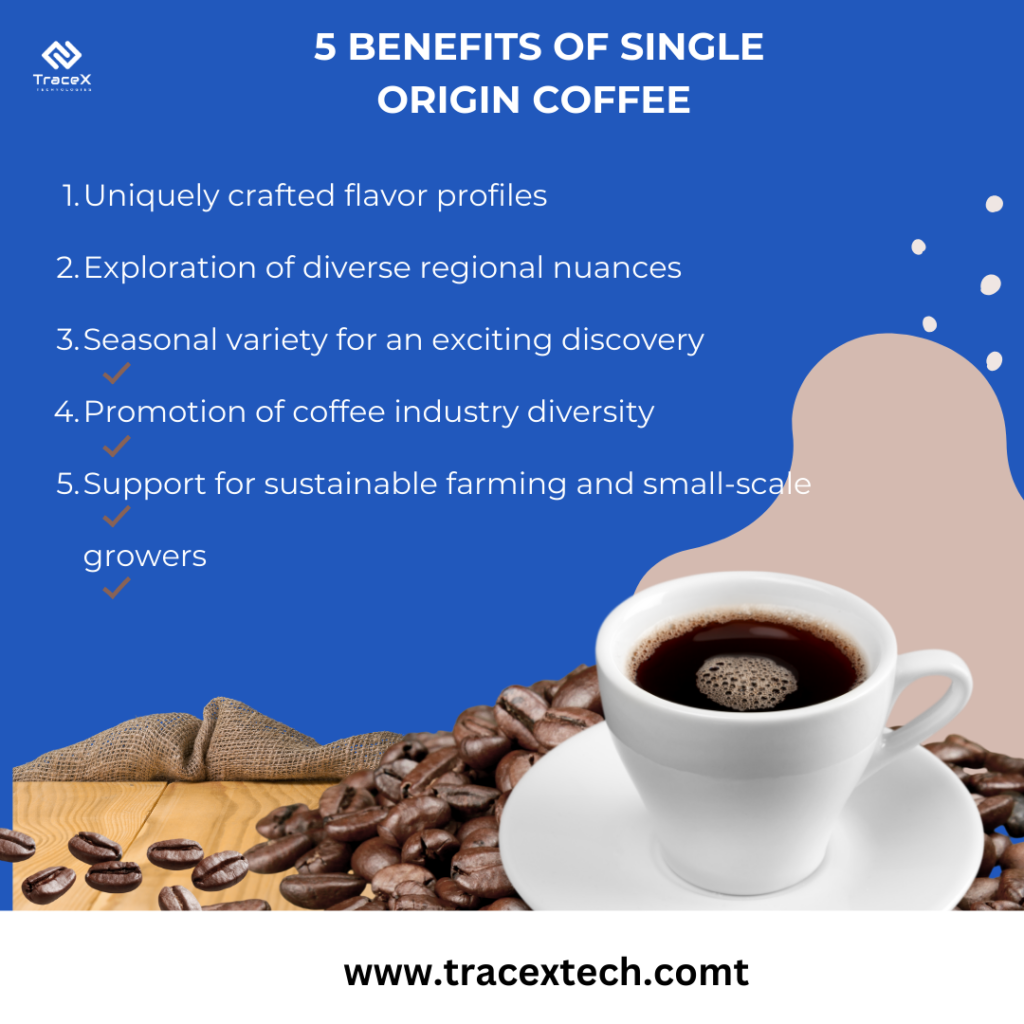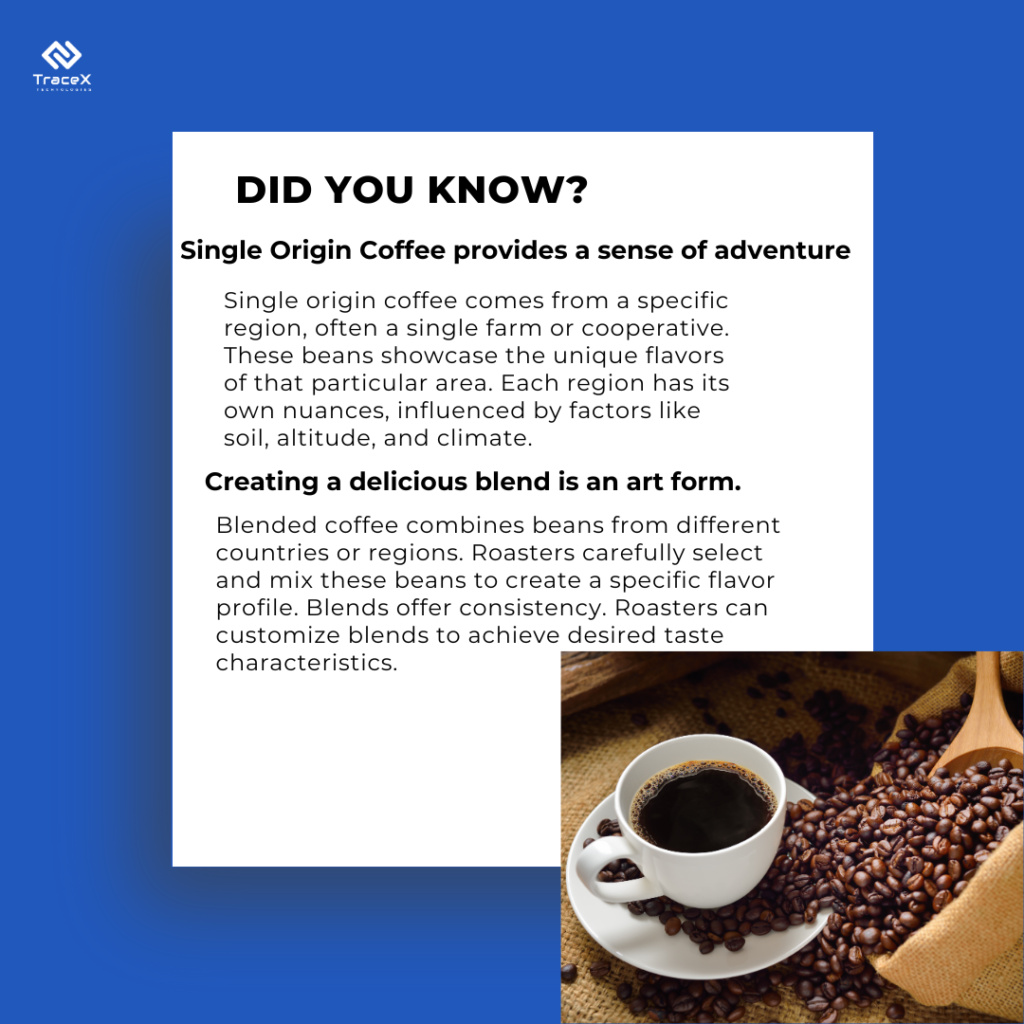Contact: +91 99725 24322 |
Menu
Menu
Quick summary: Discover the essence of single origin coffee with our comprehensive guide. Uncover the unique flavors, regional nuances, and ethical sourcing practices behind these specialty beans, offering a journey from farm to cup.

Have you ever stepped into a café, glanced at the coffee selection, and pondered why some are labelled as single origin? In the bustling world of coffee, where blends and flavored concoctions dominate café menus, there exists a hidden gem: single origin coffee. What exactly does that signify? And more importantly, does it hold any significance? These beans, sourced from specific regions or even individual farms, offer a unique and authentic coffee experience.
Single origin coffee is important in the coffee market since it provides for traceability and highlights the variety of flavours based on geography. It encourages openness, supports fair trade, and promotes sustainability. Additionally, it meets the growing customer desire for authenticity and excellence in coffee experiences.
Single origin coffee refers to beans sourced from a particular geographical region, showing unique characteristics affected by the exact environment where they’re cultivated. This covers variables such as altitude, soil type, and climate. The emphasis is on accentuating the unique features of a given region’s coffee. Single origin coffee refers to beans sourced from a certain region, estate, or farm, resulting in a distinct flavour profile influenced by unique environmental and processing conditions.
Unlike blends, which include beans from multiple origins, single origin coffee allows customers to enjoy the pure, unadulterated flavours of a given place. Blends are designed to attain consistency and balance while compromising the distinctive subtleties seen in single origin coffees.
Geography and terroir are important aspects of single origin coffee since they have a substantial impact on flavour profiles. Altitude, rainfall, and soil composition all contribute to the distinct flavour profiles of each region’s coffee, providing customers with a diverse and enriching experience impacted by the location where the beans are grown.
Single-origin coffees have different flavour characteristics, which frequently reflect the region’s particular terroir. From the fruity and floral aromas of Ethiopian Yirgacheffe to the chocolaty richness of Colombian beans, each origin provides a distinct taste experience. These coffees have distinct scents and tasting nuances that captivate coffee connoisseurs worldwide. Whether it’s the citric zest of a Kenyan brew or the nutty overtones of a Brazilian cup, single-origin types entice the senses with their distinct scents and flavours. Climate, soil composition, and altitude all influence the flavour of single-origin coffees. Beans cultivated at higher altitudes provide a more complex acidity and nuanced flavour profile, whereas soil features influence the coffee’s body and depth. Furthermore, environmental variables influence the bean’s maturing process, which affects its final flavour.
Single origin coffees offer a diverse range of flavors, influenced by factors like altitude, soil, and processing methods:
Renowned coffee-producing countries are different, with each offering unique flavours. Ethiopia stands out for its long history and distinct coffee profiles. Colombia’s high-altitude fields grow beans with a balanced acidity. Brazil, the world’s greatest producer, provides a diverse range of flavours from its wide regions.
Ethiopia’s Yirgacheffe area is known for its flowery and citrus flavours. Colombia’s Huila area yields caramel-sweet beans. Minas Gerais, Brazil, is known for its nutty and chocolate flavours.
From Ethiopia, explore Yirgacheffe, which has flowery notes. Colombia delivers Colombian Supremo, which is recognised for its balanced acidity. Brazil’s Santos beans have a mellow, nutty flavour. These examples demonstrate the diversity and excellence of single origin coffees around the world.

Each bag of single origin coffee tells a story—the journey from farm to cup. It connects you to the people and places behind your morning brew.
Follow the traceability of your favorite brew and learn about the intricate process behind every sip.
Discover the fascinating journey of coffee from bean to cup!

Single-origin coffees often come at a premium compared to blends, reflecting their status as top-quality beans sourced directly from local farmers, each highlighting a distinct regional coffee profile. These beans are typically lightly roasted and are ideally savored through manual brewing methods like the Chemex.
Opting for manual brewing over automated methods enhances the beans’ nuanced flavors, showing appreciation for their quality and resulting in a delightful experience with subtle and delicate taste notes.
Brewing procedures can bring out the distinctive flavours of single-origin coffee beans. Pour-over processes, such as Chemex or V60, allow for precision extraction while bringing forth delicate aromas. AeroPresses can enhance body and sweetness, whilst French presses emphasise boldness. Espresso’s pressure extraction amplifies flavours, making it excellent for highlighting the intricacies of high-quality beans.
To maximise the flavour experience, grind the beans immediately before brewing to preserve freshness. Use filtered water at the optimal temperature. To detect fragrances, smell the coffee first. Take modest sips to satisfy all of your taste senses, noting flavours such as fruitiness, acidity, and body. Experiment with varied brewing ratios and extraction periods to achieve your chosen flavour profile.
Enhance the tasting experience by pairing single-origin coffee with complimentary dishes. Lighter roasts with floral or fruity flavours go nicely with pastries or fruit salads. Medium roasts with caramel or nutty flavours pair well with desserts such as chocolate cake. Darker roasts with bolder flavours pair well with rich, savoury foods like steak and dark chocolate. For a memorable culinary experience, try contrasting and harmonising flavours.

Sustainable agricultural practices are critical in the single origin coffee industry for preserving ecological balance, biodiversity, and long-term profitability. Farmers build better ecosystems and protect the environment by focusing on approaches such as organic farming, shade-grown techniques, and soil conservation.
Fair trade and ethical sourcing are essential to the single origin coffee business, ensuring that farmers are fairly compensated for their labour, encouraging community development, and adhering to human rights standards. Ethical sourcing efforts empower producers, increase transparency, and foster mutually beneficial partnerships all throughout the supply chain.
The environmental impact of coffee manufacturing emphasises the necessity for conservation initiatives. By employing eco-friendly methods like agroforestry, water conservation, and carbon offset programmes, the industry may reduce its environmental impact, safeguard natural habitats, and contribute to global conservation goals.
Traceability solutions can help address the challenges in single-origin coffee in the following ways:
1. Limited Availability: By providing real-time visibility into the supply chain, traceability solutions enable stakeholders to monitor the availability of single-origin coffee from specific regions or farms. This helps in better planning and management of inventory to mitigate the impact of limited availability.
2. Price Volatility: Traceability solutions can track various factors affecting the price of single-origin coffee, such as weather conditions and market demand. With access to this data, stakeholders can make informed decisions regarding pricing strategies, risk management, and investment in sustainable production practices.
3. Quality Consistency: Traceability solutions track the journey of single-origin coffee from farm to cup, allowing stakeholders to monitor and control various factors affecting quality, such as farming practices, processing methods, and storage conditions. This ensures consistent quality across batches and enhances consumer confidence in the product.
4. Supply Chain Complexity: By providing transparency and traceability throughout the supply chain, traceability solutions simplify the management of complex supply chains associated with single-origin coffee. This includes tracking the movement of coffee beans, verifying the authenticity of origin claims, and ensuring compliance with regulatory standards.
5. Market Competition: Traceability solutions can differentiate single-origin coffee offerings by providing verifiable information about the coffee’s origin, quality, and sustainability credentials. This helps in building trust with consumers and gaining a competitive edge in the market.
6. Sustainability Concerns: Traceability solutions enable stakeholders to monitor and track sustainability metrics such as environmental impact, fair labor practices, and economic viability along the supply chain. By promoting transparency and accountability, traceability solutions support efforts to improve sustainability practices in single-origin coffee production.
TraceX blockchain traceability solutions revolutionize the journey of coffee from bean to cup by providing a transparent and secure platform for tracking every stage of production. With TraceX, coffee enthusiasts can trace the origin of their beans, ensuring authenticity and quality. By leveraging blockchain technology, TraceX enhances transparency in the supply chain, allowing consumers to follow the journey of their coffee beans from the farm to the roastery and ultimately to their cup. This level of traceability not only promotes trust and confidence among consumers but also supports ethical sourcing practices and sustainability efforts in the coffee industry.
Check how TraceX helps in navigating the bean to cup journey of coffee beans from Nitapattu in the famous Araku valley
Learn More
To summarise, sustainable agricultural standards, fair trade principles, and environmental conservation initiatives are critical components of the single origin coffee sector. Prioritising these criteria allows stakeholders to improve ecological health, assure fair treatment of farmers, and reduce negative environmental impacts. Embracing sustainability and ethical sourcing improves coffee quality while also fostering a more just and environmentally conscious global coffee community. As consumers, supporting projects that prioritise these values allows us to have a beneficial impact on both the environment and the livelihoods of coffee producers. Finally, by recognising the value of sustainability, fairness, and conservation, we can help to build a more resilient and ethical coffee business for future generations.
